10+ Data Analyst Job Description Examples to Download
We may have encountered businesses that are data-driven. This means that they are being confident with their plans, actions, and procedures because a particular data supports them. Doing a data analysis means you have to collect and analyze data. This requires good analytical and logical reasoning to produce a piece of information based on the given data. What do you call someone who does data analysis? A data analyst, right? If you are planning to apply for a job as a data analyst, consider the following information that you might want to take note of to assess yourself if you have the following skills.
10+ Data Analyst Job Description Examples
1. Senior Data Analyst Job Description Template
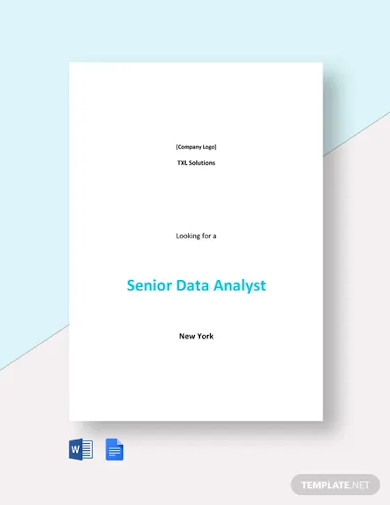
2. Marketing Data Analyst Job Description Template
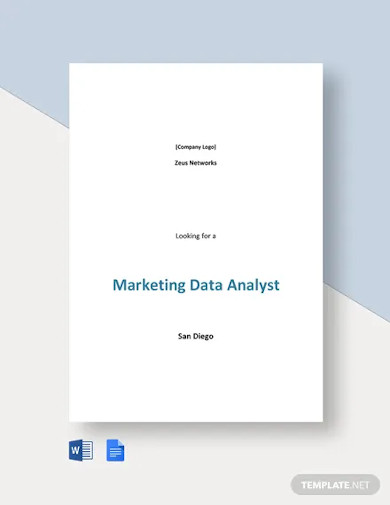
3. Junior Data Analyst Job Description Template
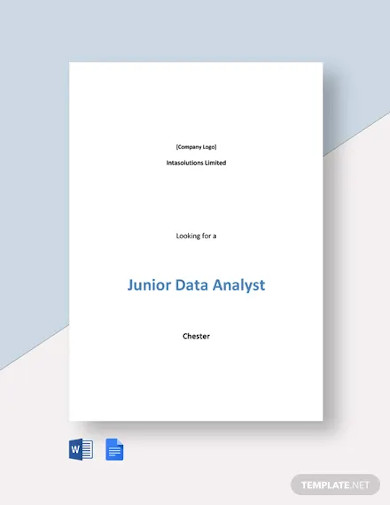
4. Basic Data Analyst Job Description
5. Data Analyst Job Description Example
6. Data Quality Analyst Job Description
7. Pharmacy Data Analyst Job Description
8. Energy Data Analyst Job Description
9. Accounting Data Analyst Job Description
10. Farm Data Analyst Job Description
11. Data Analyst Job Description in DOC
Data Analyst Job Description
A data analyst would interpret sets of data and turns them into information that helps you improve the overall status of your business. They collect information from different reliable sources and interpret them based on their patterns and trends. They can even make some recommendations with regards to what method is appropriate to use and what ways should a company analyze data to ensure quality and efficiency.
Typical duties of a data analyst include:
-
-
- collecting and interpreting data
- analyzing results based from the given data
- reporting the results to the important members of the organization
- identifying patterns and trends
- working with teams to provide the needs of the business
- defining new data collection process
- removing corrupted data
- preparing reports based on analysis
-
Employers of Data Analysts
The typical employers of data analysts include banks, consultancies, public sector organizations, software development companies, social media socialists, telecommunications companies, manufacturers, pharmaceutical companies and even colleges and universities.
Qualifications and Trainings Required
The usual entry point especially for fresh graduates are those that has a degree in mathematics, statistics, economics or data science. Other degrees might be acceptable only if they have undergone trainings involving statistics as part of the subject course. There are also qualities to expect from someone who will apply as a data analyst. He or she must have an experience in data models, analyze datasets, write comprehensive reports, strong communication skills, inclined into problem solving and most importantly, the ability to provide good attention to details.
Essential Skills for Data Analysts
1. Structured Query Language
This is an industry-standard database language and probably one of the most important skill that every data analyst should have. This can handle large datasets compared to any applications.
2. Microsoft Excel
Advanced Excel methods such as writing Macros and using VBA lookups are used for quick analytics. Every company experienced having Microsoft Excel as their first version of database. However, Excel is limited only into huge datasets.
3. Critical Thinking
Think like an analyst. It is his or her role to synthesize connections that are not clear. There are many ways on how to improve your critical thinking skills. You may consider asking yourself about the issue and search for a better solution. It is also a good practice to start thinking for yourself rather than relying on others and on what is already there.
4. Data Visualization
You will be having a difficulty in getting through the data when you cannot identify your findings easily. Analysts would usually favor including charts and graphs in presenting the data.
5. Presentation Skills
Data visualization and presentation skills need to go along together. Always start with practicing. Set specific goals so that you will improve and give your whole focus to your audience rather than taking more time in making yourself more comfortable.
FAQs
How is data analytics used in business?
They help every organizations to improve their decision making skills. Analyzing a data would give them insights according to their needs to bring themselves into the right choices.
What are the types of data analysis?
The types of data analysis include descriptive analysis, diagnostic analysis, predictive analysis and prescriptive analysis.
Why do data analysts have to pull from a raw data?
The results from the raw data will help their employers make necessary decisions that would enable them to identify facts and trends.
As someone who is interested in applying for data analyst job, you need to be familiar with the skills and starting working on with data. Improving your data analytics knowledge would help you in bringing yourself closer to more opportunities. Take advantage of books and other resources as well. Doing so will let you be familiar with the necessary terms used in data analysis.
10+ Data Analyst Job Description Examples to Download
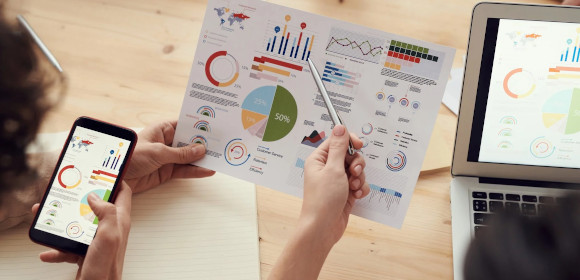
We may have encountered businesses that are data-driven. This means that they are being confident with their plans, actions, and procedures because a particular data supports them. Doing a data analysis means you have to collect and analyze data. This requires good analytical and logical reasoning to produce a piece of information based on the given data. What do you call someone who does data analysis? A data analyst, right? If you are planning to apply for a job as a data analyst, consider the following information that you might want to take note of to assess yourself if you have the following skills.
10+ Data Analyst Job Description Examples
1. Senior Data Analyst Job Description Template

Details
File Format
MS Word
Google Docs
2. Marketing Data Analyst Job Description Template

Details
File Format
MS Word
Google Docs
[
3. Junior Data Analyst Job Description Template

Details
File Format
MS Word
Goggle Docs
4. Basic Data Analyst Job Description
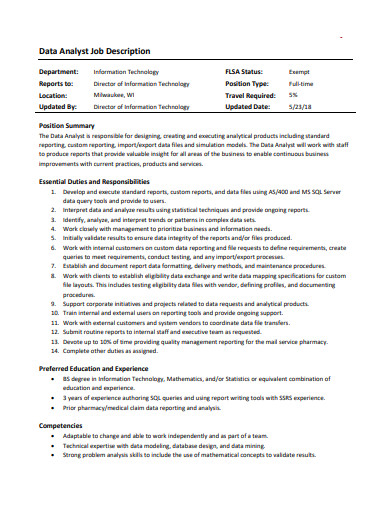
serve-you-rx.com
Details
File Format
PDF
Size: 87 KB
5. Data Analyst Job Description Example
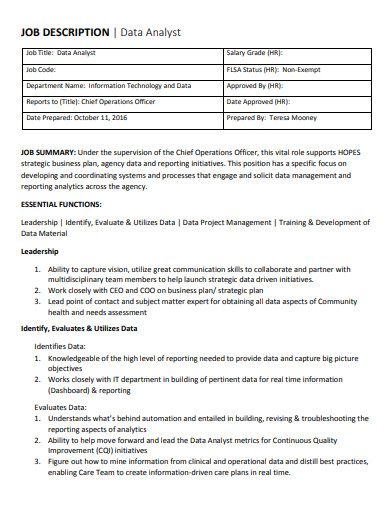
nnhopes.org
Details
File Format
PDF
Size: 404 KB
6. Data Quality Analyst Job Description
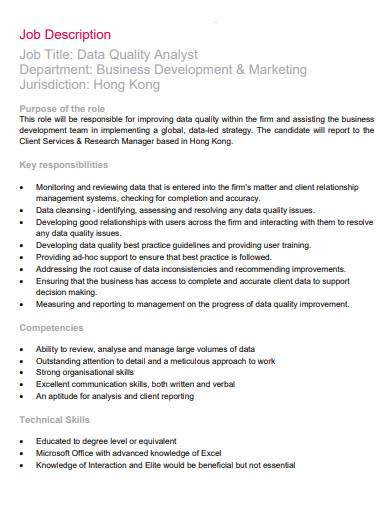
ogier.com
Details
File Format
PDF
Size: 23 KB
7. Pharmacy Data Analyst Job Description
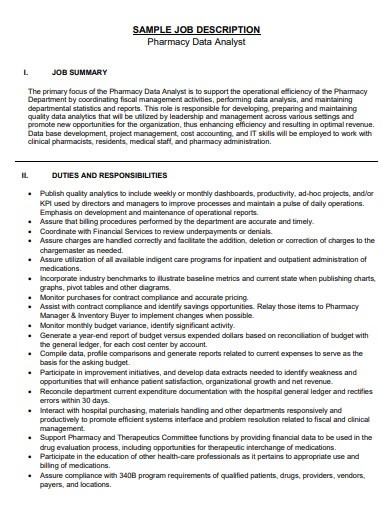
ashp.org
Details
File Format
PDF
Size: 23 KB
8. Energy Data Analyst Job Description
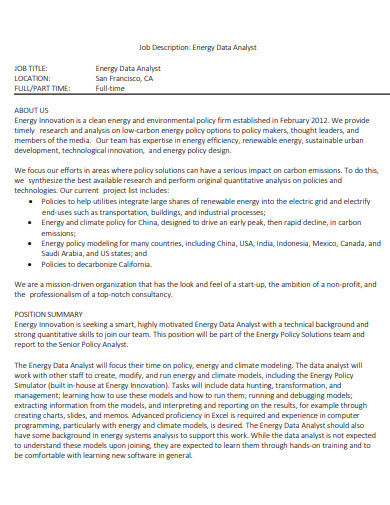
energyinnovation.org
Details
File Format
PDF
Size: 159 KB
9. Accounting Data Analyst Job Description
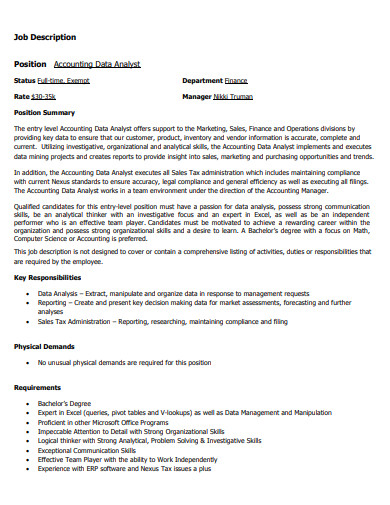
envexp.com
Details
File Format
PDF
Size: 224 KB
10. Farm Data Analyst Job Description
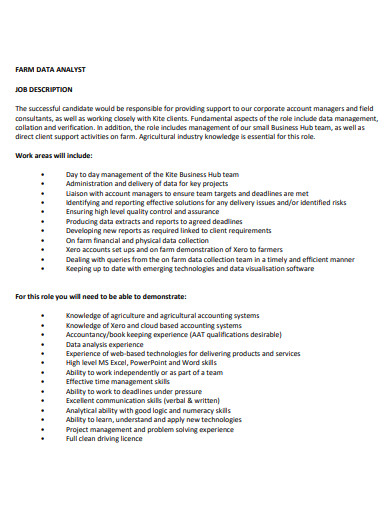
kiteconsulting.com
Details
File Format
PDF
Size: 407 KB
11. Data Analyst Job Description in DOC
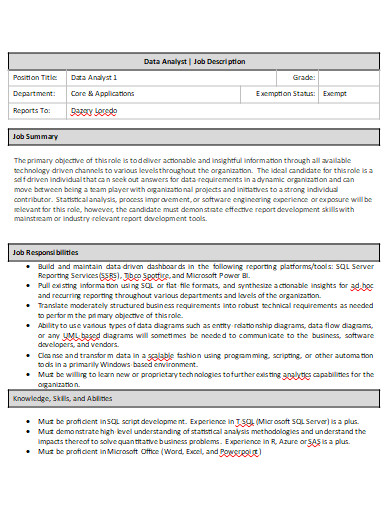
utsa.edu
Details
File Format
DOC
Size: 27 KB
Data Analyst Job Description
A data analyst would interpret sets of data and turns them into information that helps you improve the overall status of your business. They collect information from different reliable sources and interpret them based on their patterns and trends. They can even make some recommendations with regards to what method is appropriate to use and what ways should a company analyze data to ensure quality and efficiency.
Typical duties of a data analyst include:
collecting and interpreting data
analyzing results based from the given data
reporting the results to the important members of the organization
identifying patterns and trends
working with teams to provide the needs of the business
defining new data collection process
removing corrupted data
preparing reports based on analysis
Employers of Data Analysts
The typical employers of data analysts include banks, consultancies, public sector organizations, software development companies, social media socialists, telecommunications companies, manufacturers, pharmaceutical companies and even colleges and universities.
Qualifications and Trainings Required
The usual entry point especially for fresh graduates are those that has a degree in mathematics, statistics, economics or data science. Other degrees might be acceptable only if they have undergone trainings involving statistics as part of the subject course. There are also qualities to expect from someone who will apply as a data analyst. He or she must have an experience in data models, analyze datasets, write comprehensive reports, strong communication skills, inclined into problem solving and most importantly, the ability to provide good attention to details.
Essential Skills for Data Analysts
1. Structured Query Language
This is an industry-standard database language and probably one of the most important skill that every data analyst should have. This can handle large datasets compared to any applications.
2. Microsoft Excel
Advanced Excel methods such as writing Macros and using VBA lookups are used for quick analytics. Every company experienced having Microsoft Excel as their first version of database. However, Excel is limited only into huge datasets.
3. Critical Thinking
Think like an analyst. It is his or her role to synthesize connections that are not clear. There are many ways on how to improve your critical thinking skills. You may consider asking yourself about the issue and search for a better solution. It is also a good practice to start thinking for yourself rather than relying on others and on what is already there.
4. Data Visualization
You will be having a difficulty in getting through the data when you cannot identify your findings easily. Analysts would usually favor including charts and graphs in presenting the data.
5. Presentation Skills
Data visualization and presentation skills need to go along together. Always start with practicing. Set specific goals so that you will improve and give your whole focus to your audience rather than taking more time in making yourself more comfortable.
FAQs
How is data analytics used in business?
They help every organizations to improve their decision making skills. Analyzing a data would give them insights according to their needs to bring themselves into the right choices.
What are the types of data analysis?
The types of data analysis include descriptive analysis, diagnostic analysis, predictive analysis and prescriptive analysis.
Why do data analysts have to pull from a raw data?
The results from the raw data will help their employers make necessary decisions that would enable them to identify facts and trends.
As someone who is interested in applying for data analyst job, you need to be familiar with the skills and starting working on with data. Improving your data analytics knowledge would help you in bringing yourself closer to more opportunities. Take advantage of books and other resources as well. Doing so will let you be familiar with the necessary terms used in data analysis.

